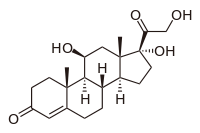
Photo from wikipedia
The aim of this study was to evaluate the effect of berberine (BBR) on the intestinal health of piglets exposed to deoxynivalenol (DON). A total of 180 weaned piglets were… Click to show full abstract
The aim of this study was to evaluate the effect of berberine (BBR) on the intestinal health of piglets exposed to deoxynivalenol (DON). A total of 180 weaned piglets were randomly allotted to 1 of 3 treatment groups with 10 replication pens per treatment and 6 piglets per pen. The treatments were basal diet, basal diet +4 mg/kg DON, and basal diet +4 mg/kg DON +40 mg/kg BBR. The experiment lasted for 21 d. BBR improved the growth performance of DON-challenged piglets. BBR could inhibit DON-induced intestinal injury by increasing the expression of serum antioxidant enzymes and T cell surface antigens and reducing the release of proinflammatory cytokines in the small intestine. BBR significantly increased the protein expression levels of zonula occludens 1 (ZO-1), Occludin and Claudin-1 in the ileal and jejunal mucosa and increased the morphological parameters of the jejunum. Moreover, we found that BBR significantly reduced the DON-induced gene and protein expression levels of ERK, JNK, and NF-κB in the jejunum and ileum. In conclusion, BBR can regulate DON-induced intestinal injury, immunosuppression and oxidative stress by regulating the NF-κB and MAPK signaling pathways and ultimately maintain the intestinal health of piglets.
Journal Title: Environmental pollution
Year Published: 2021
Link to full text (if available)
Share on Social Media: Sign Up to like & get
recommendations!